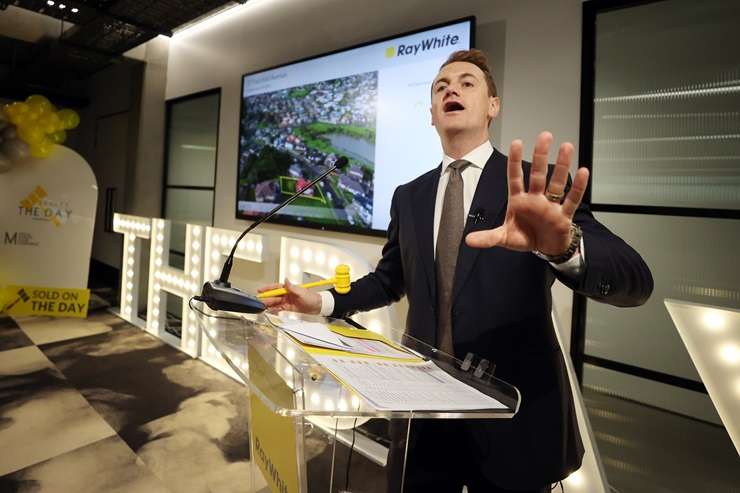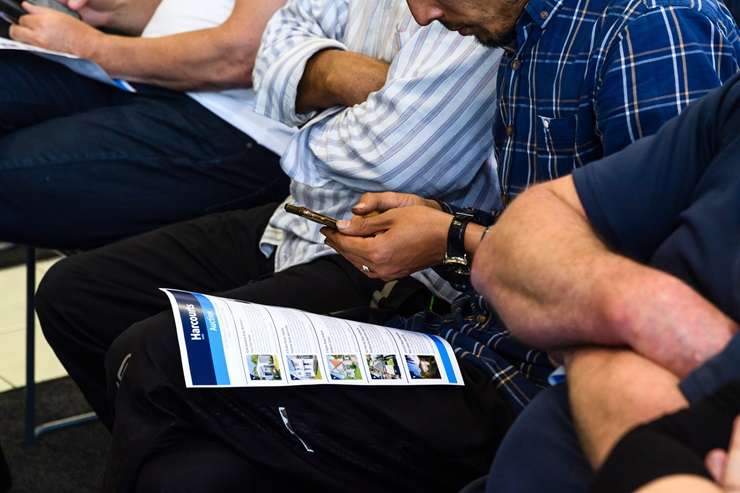The auctioneer called it “the strangest auction I’ve ever done”. Host Scott Cam was gobsmacked. “That’s never happened before,” he spluttered.
The finale of The Block Australia, which aired on New Zealand screens on Sunday, made history as the winners took home A$1.75 million in prize money after their house sold for A$5m.
But it was the bidding tactics of buyer Adrian Portelli that surprised viewers and producers.
Multi-millionaire Portelli, who bought three of the show’s homes for a total of A$12.4m, was at one point bidding against himself.
Start your property search
During the second auction of the season 19 finale, Portelli raised his own bid several times by A$100,000, even though he was in front, the reserve had been passed and no one else was bidding.
Read more:
- Olympic sailor’s iconic Takapuna house sells for $4.705m
- Couple’s all-night celebrations wake up the neighbours after house sells for $300K above CV
- Auction frenzy: Deceased estate with leaky toilet sells for $1.2m
Portelli, who is the founder of rewards club LMCT+, which offers discounts to members and gives away luxury vehicles and prestige houses each month, said he “didn’t know” why he ended up bidding against himself.
But the tactic isn’t that uncommon in Australia, with buyers often upping the stakes to scare off rival bidders and trick them into thinking they have an unlimited funds.
Real estate professionals told OneRoof it happens in New Zealand as well.
Ray White lead auctioneer Sam Steele said he saw a buyer bid against themselves just last week.
“It happens all the time. It’s probably the most impactful tactic that you can employ.”
He said it was often used by someone who was holding the bid and thought the opposition might make a move so decided to beat them to it before having to place an even higher bid.
“If you are standing at an auction and if you’ve got the highest bid and say it’s on the market and you can see some other people might bid or are talking and thinking about it and then you bid again, well it’s just going to wipe them out straight away."

Ray White lead auctioneer Sam Steele: "It happens all the time. It’s probably the most impactful tactic that you can employ.” Photo / Fiona Goodall
Buyers also did it to show strength and scare the other buyers away, he said.
Steele said it happened over a range of properties including do-ups, high-end homes and farms.
“It would happen to me on a fortnightly basis. The majority of the time before [the reserve has been met], but it’s not all the time.”
Steele believed Portelli’s “quirky” bids were a calculated move aimed at getting as much attention as possible for his business, and said they ultimately worked because not only did he make headlines afterwards, but he also bought the house.
“Whatever their intentions are good on them, but it’s something that has worked in his favour because people are still talking about it.”
Bayleys national auction manager Connor Patton agreed it was not uncommon for buyers to employ certain strategies such as bidding on themselves and sees it about once a month – although the increments weren’t always as large Portelli’s A$100,000 bids.
“The reason buyers will do it is if they’ve been coached by an agent or if they’ve been to auctions a few times and they are more experienced – it’s just a way to discourage the competition from actually bidding.”

Auctioneers told OneRoof that buyers often use the tactic to scare off the competition. Photo / Getty Images
He said it was used as a way of stopping other bidders from joining the auction or making a “knockout” punch to stop a bidding war playing out.
“It’s about them gaining confidence and trying to gain the upper hand psychologically and it’s no different than other bidders trying to add odd numbers to try and throw things off balance. They are just trying to use the live auction to their advantage, but a lot of people are too nervous to do that.”
It’s a far less common occurrence in Barfoot & Thompson’s auction rooms. Operations manager Vaughan Borcovsky said the auctioneers would always check that someone had intended to place a bid on their own bid and they hadn’t made a mistake in the heat of the moment.
Unlike some other agencies, Barfoot & Thompson did not place vendor bids, so any bid had to be made by a would-be buyer either on the floor or the phone.
A bidder might increase their bid if it hadn’t met the reserve, he said, but it was also more likely that if there was only one bidder then the auction would pause for negotiation outside the auction room.
“What would tend to happen if they see they are the only one bidding, if we can’t get an advance from them or anyone else then we negotiate and let them know that they are not at reserve yet and maybe they would want to increase their bid and that’s generally what does happen.
“But once we have confirmed it’s on the market, it would be very unusual for us at Barfoot & Thompson to have people increasing their own bid when they are the only one bidding.”
Property coach and investor Nathan Broughton said it was not a technique he’d ever used when bidding at auction or one he’d even seen anyone else deploy in any of the Christchurch auction rooms.
“Even if it was below reserve, if no one else was bidding I wouldn’t be bidding on to of myself I would be wanting to go outside the room and negotiate,” he said.
“You wouldn’t want to pay more than you have to.”
- Click here to find properties for sale













































































